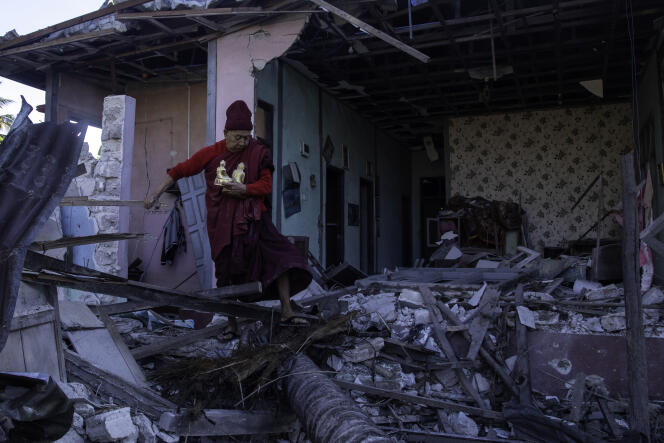


The rocky hills topped with Christian crosses gave way to yellowing rice paddies. In the distance, the white smoke of the slash-and-burn fields cast a pall over the plain. From the countryside, it was a smooth transition into the northern outskirts of Loikaw, a checkerboard of gardens, wooden houses and flower-filled villas, some of which bear the scars of battle.
This capital of Kayah State, in Myanmar's east, was entirely besieged by the anti-junta resistance movement. The inhabitants have left. This ghost town has come under the control of a kind of underground army, the Karenni Nationalities Defense Forces (KNDF). It has been named after the region's dominant ethnic group and formed following February 1, 2021, military coup that toppled the government of Aung San Suu Kyi. On November 11, 2023 – two and a half years after its creation in May 2021 – the KNDF launched a vast offensive to overthrow the capital of Kayah State, or Karenni State, as the locals call it.
Since then, the junta's administration has packed up and left and the Tatmadaw, Myanmar's army, has been pushed back to its last defensive positions: At the end of January, around a thousand soldiers and officers were still occupying the large military base near the airport, a rectangle 1.5 kilometers in length. "Small groups of soldiers still hold the prison and six official buildings in the city center, including the state parliament and the local government headquarters," explained the commander, Dede, who sported a thin black moustache and goatee, his forehead wrinkled from a day of keeping watch from a hideout on the city's outskirts.
"These army positions are well defended, they've been transformed into bunkers. They have tanks. Heavy weapons. But they're just defending themselves," continued the veteran. In his fifties, he is one of the oldest of the KNDF commanders, those men who are the talk of the resistance movement. Khun Bedu, the big boss, is a well-known dissident. The second-in-command, Mawi, a Bamar man (Myanmar's majority ethnic group) born in Loikaw, used to have an organic farm. Commander Dede came up through the Free Burma Rangers, an American evangelical humanitarian aid association that trains first-aid teams for the front lines.
Apart from these strongholds, the military have no freedom of movement. Only the pickup trucks used by the "revolution's" fighters are on the roads in the suburbs: Proud-looking young men, with automatic rifles slung over their shoulders, black helmets on their heads or their hair styled in a Karenni bun. The airport is unusable, under rebel fire. The road to Naypyidaw, Myanmar's capital, is cut off. The army's positions can only be resupplied by helicopter.
You have 75% of this article left to read. The rest is for subscribers only.
